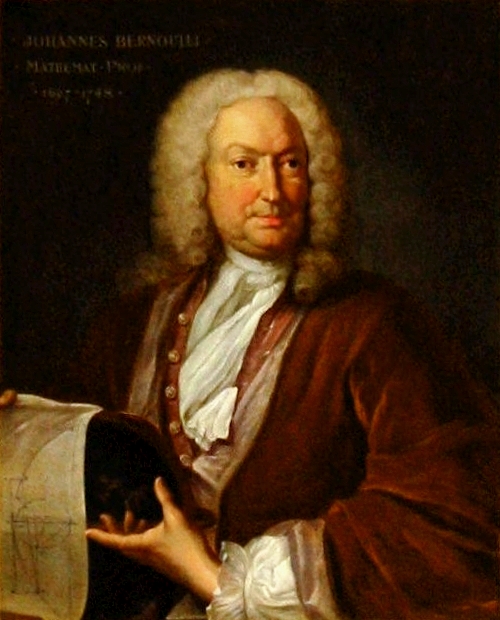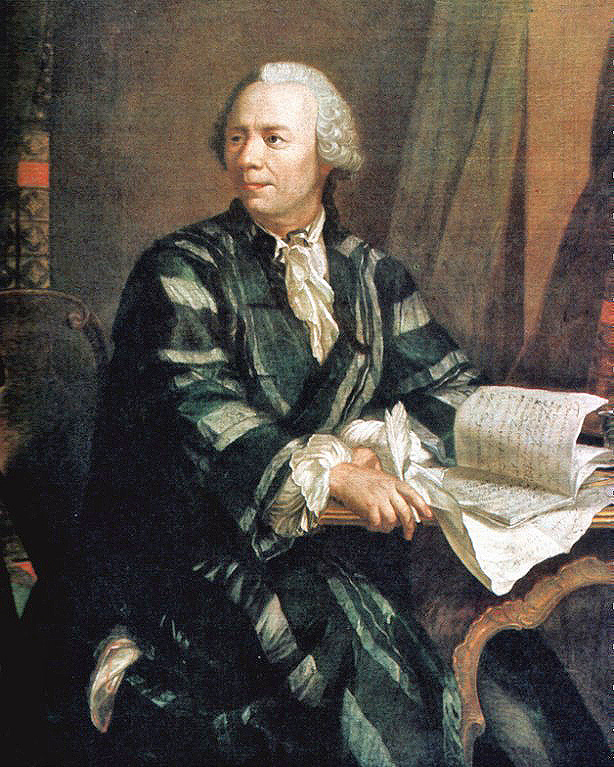- About MAA
- Membership
- MAA Publications
- Periodicals
- Blogs
- MAA Book Series
- MAA Press (an imprint of the AMS)
- MAA Notes
- MAA Reviews
- Mathematical Communication
- Information for Libraries
- Author Resources
- Advertise with MAA
- Meetings
- Competitions
- Programs
- Communities
- MAA Sections
- SIGMAA
- MAA Connect
- Students
- MAA Awards
- Awards Booklets
- Writing Awards
- Teaching Awards
- Service Awards
- Research Awards
- Lecture Awards
- Putnam Competition Individual and Team Winners
- D. E. Shaw Group AMC 8 Awards & Certificates
- Maryam Mirzakhani AMC 10 A Awards & Certificates
- Two Sigma AMC 10 B Awards & Certificates
- Jane Street AMC 12 A Awards & Certificates
- Akamai AMC 12 B Awards & Certificates
- High School Teachers
- News
You are here
Euler and the Bernoullis: Learning by Teaching - Johann Bernoulli and Leonhard Euler
The first and best tutor the younger Johann Bernoulli (1667-1748) had was likely his brother Jakob. It is well known of the brothers that they had a stormy relationship filled with bitterness and accusations, but this would come later. Of Johann, William Dunham wrote
Two facts about (Johann) Bernoulli should be noted. First, he was a proud and arrogant man, as quick to demean the work of others as to praise that of himself. Second, any such praise was probably deserved. [4, p. xx]
It must have been Jakob who ignited a passion for mathematical learning in his brother (he would certainly later claim credit for many of his brother’s achievements). As René Descartes wrote, “If one has any sort of skill, I can think of nothing for which a taste, a very passion, cannot be aroused in children,” [3] and Jakob was certainly passionate about mathematics.

Figure 4. Painting of Johann Bernoulli (1667–1748) by Johann Rudolf Huber (1668-1748) around 1742 (Wikimedia Commons, public domain)
From his early twenties Johann discussed and worked with his older brother on mathematics; we know this from letters which they exchanged, as discussed in [9] and elsewhere. Just as his father had wanted Jakob to make his career in the ministry, Nicolaus intended his youngest son for a career in business. Johann would have none of this. He intended to follow in his brother’s footsteps.

Figure 5. Painting of Leonhard Euler (1707–1783) by Jakob Emanuel Handmann (1718-1781) around 1756 (Wikimedia Commons, public domain. See also Leonhard Euler – Image Gallery in the MAA’s Euler Archive.)
Leonhard Euler (1707–1783) was a contemporary and countryman of Jean Jacques Rousseau (1712–1778). Euler was born in Basel in 1707, five years earlier than Rousseau and 252 kilometers from Rousseau’s birthplace of Geneva; both Basel and Geneva were city-states in the Swiss Confederacy. This was a time in the history of Europe, the dawning of the Enlightenment, when the world was beginning to be viewed in terms of mathematics (see Note 3). As René Descartes (1596–1650), the source of the fundamental ideas upon which Euler and the Bernoullis were to expand so significantly, affirmed in his work, Meditations,
I reckoned among the number of the most certain truths those I clearly conceived relating to figures, numbers, and other matters that pertain to arithmetic and geometry, and in general to the pure mathematics. [3]
In his seminal work, Émile, Rousseau said of education,
We are born weak, we need strength; helpless, we need aid; foolish, we need reason. All that we lack at birth, all that we need when we come to man's estate, is the gift of education. This education comes to us from nature, from men, or from things. The inner growth of our organs and faculties is the education of nature, the use we learn to make of this growth is the education of men, what we gain by our experience of our surroundings is the education of things. Thus we are each taught by three masters. If their teaching conflicts, the scholar is ill-educated and will never be at peace with himself; if their teaching agrees, he goes straight to his goal, he lives at peace with himself, he is well-educated. [8]
As indicated at the start of this article, the use Euler learned to make of what nature had provided was gained in large part from Johann Bernoulli, the brother of Jakob and father of Daniel.
Note 3. “And with regard to the ideas of corporeal objects, I never discovered in them anything so great or excellent which I myself did not appear capable of originating; for, by considering these ideas closely and scrutinizing them individually, in the same way that I yesterday examined the idea of wax, I find that there is but little in them that is clearly and distinctly perceived. As belonging to the class of things that are clearly apprehended, I recognize the following, viz., magnitude or extension in length, breadth, and depth; figure, which results from the termination of extension; situation, which bodies of diverse figures preserve with reference to each other; and motion or the change of situation; to which may be added substance, duration, and number.” [3]
Paul Bedard (Saint Clair County Community College), "Euler and the Bernoullis: Learning by Teaching - Johann Bernoulli and Leonhard Euler," Convergence (August 2015)




